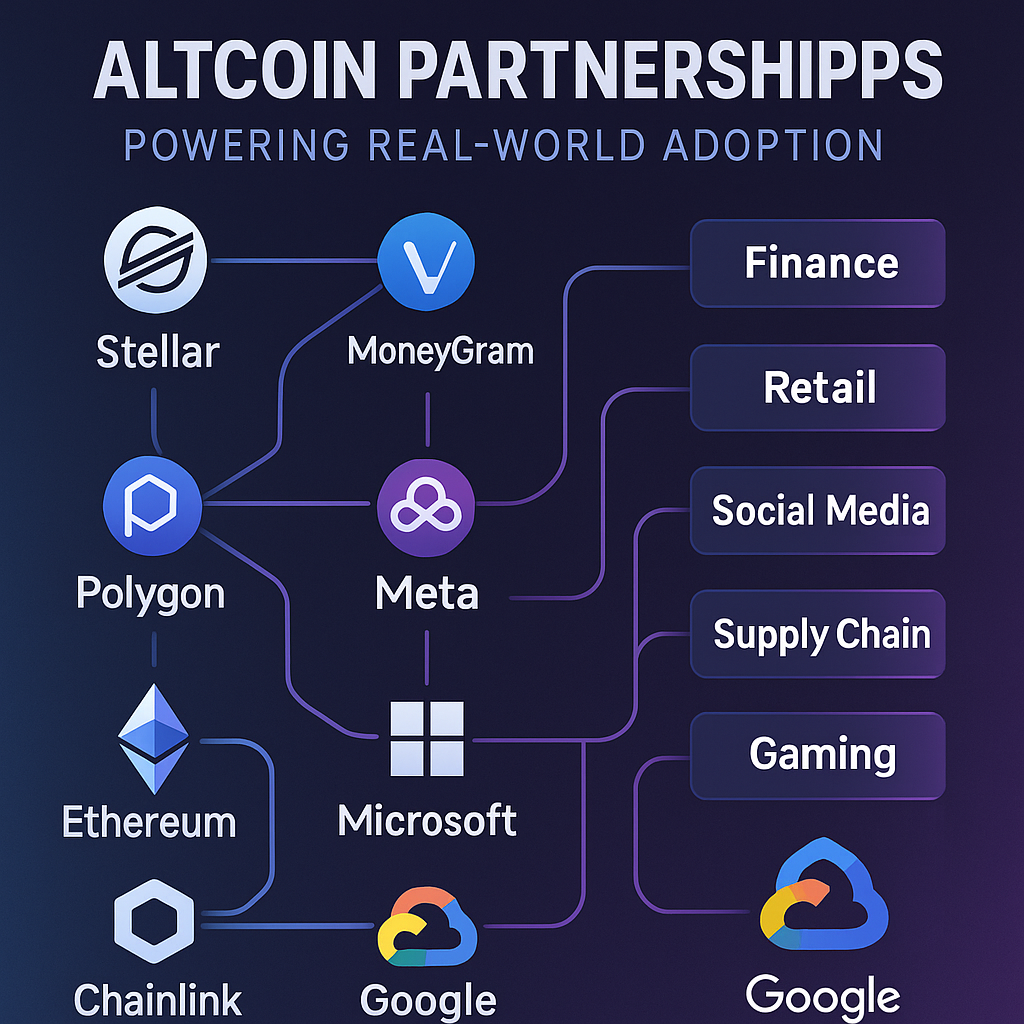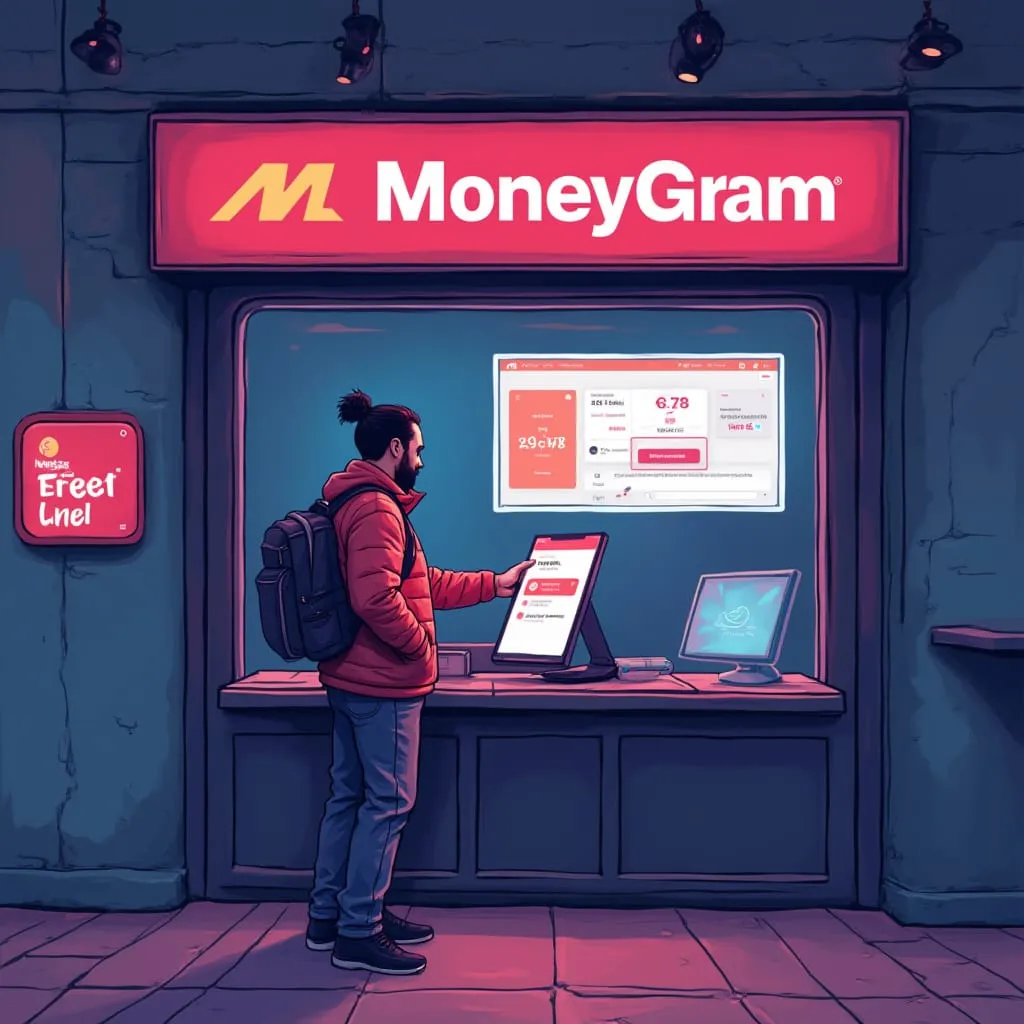Altcoin Partnerships with Major Companies
Altcoin Partnerships: The cryptocurrency space is evolving rapidly.
No longer just a speculative asset class, digital currencies—especially altcoins—are becoming integrated into real-world applications.
One of the most significant developments? Altcoin partnerships with major companies.
These collaborations are not only validating the crypto space but also driving widespread adoption.
From payments and supply chain to loyalty programs and Web3 innovations, altcoins are finding a place in the global economy.
But what exactly are these partnerships?
Why are they important? And which companies are taking the leap?
Let’s dive into the heart of this crypto transformation.
What Are Altcoin Partnerships with Major Companies?
Altcoins are any cryptocurrencies other than Bitcoin.
This includes Ethereum, Solana, Chainlink, Cardano, and thousands more.
Major companies, from Fortune 500 tech giants to global retailers, are teaming up with these blockchain projects for strategic benefits.
An altcoin partnership typically involves:
• Integration of blockchain technology into existing business models.
• Joint development of new decentralized apps (dApps).
• Enabling crypto payments via altcoins.
• Using tokens for loyalty and rewards systems.
• Enhancing security, transparency, or traceability.

Why Are Big Companies Partnering with Altcoins?
The answer is simple: innovation and efficiency.
These partnerships bring real-world utility to altcoins and offer corporations a chance to stay ahead in an increasingly digitized world.
Key Reasons for Corporate Interest in Altcoin Partnerships:
1. Cost Reduction – Blockchain technology streamlines transactions and eliminates intermediaries.
2. Transparency and Security – Immutable ledgers ensure trust in transactions.
3. Global Reach – Altcoins offer fast, borderless payment systems.
4. Tokenization and Digital Assets – Transforming real-world items into tradable digital tokens.
5. Customer Engagement – Through NFTs, loyalty points, and gamified platforms.

Notable Altcoin Partnerships with Major Companies
Several altcoins have already landed high-profile deals.
These partnerships span various sectors—from finance and gaming to logistics and social media.
1. Ethereum and Microsoft
Microsoft Azure has partnered with Ethereum to provide Blockchain-as-a-Service (BaaS) to enterprise clients.
Companies can develop and deploy smart contracts and decentralized apps (dApps) using Ethereum’s platform.
Why It Matters:
• It shows enterprise trust in public blockchain networks.
• Opens doors for business automation using smart contracts.
2. ChainLink and Google Cloud
Chain Link, known for its decentralized oracles, works with Google Cloud to make off-chain data accessible on blockchain platforms.
Impact Highlights:
• Supports hybrid smart contract development.
• Enhances DeFi data reliability.
3. Polygon and Meta (Facebook)
Meta selected Polygon to power NFTs on Instagram.
This gives creators tools to mint, sell, and showcase NFTs directly within the social app.
What It Means:
• Altcoin infrastructure can support mainstream social media.
• Paves the way for NFT mass adoption.
4. VeChain and Walmart China
Blockchain by VeChain is used by Walmart China for food safety traceability.
Each product is tracked from origin to shelf.
Benefits Realized:
• Boosts consumer trust.
• Reduces waste and fraud.
5. Stellar and MoneyGram
This blockchain facilitates fast and low-cost cross-border payments for MoneyGram users.
Customers can cash out their crypto to fiat and vice versa at physical locations.
User Perks:
• Greater accessibility to digital assets.
• Improved remittance services.
Industries Leading the Way in Altcoin Collaboration
Certain sectors are more open to crypto integration than others.
Here’s a closer look:
1. Finance & Payments
• Visa and Mastercard pilot altcoin-based payment rails.
• Banks explore DeFi protocols and tokenized lending.
2. Retail & E-commerce
• Shopify supports altcoin payments via integrations.
• Brands like Gucci accept crypto for luxury goods.
3. Gaming & Metaverse
• Ubisoft and Square Enix back blockchain games.
• Axie Infinity and The Sandbox partner with altcoin platforms.
4. Logistics & Supply Chain
• IBM’s Food Trust works with altcoins like VeChain and OriginTrail.
• Increases traceability and quality control.
5. Social Media & Content Creation
• Twitter explores tipping via altcoins.
• Web3 platforms like Audius use crypto to pay creators directly.
Benefits of Altcoin Partnerships for Companies
Altcoin integration offers tangible advantages to corporations willing to adapt:
• Increased Efficiency: Smart contracts automate manual processes.
• Data Security: Decentralized networks reduce hacking risks.
• Brand Modernization: Crypto-savvy customers appreciate innovation.
• Global Payments: Access new markets with minimal friction.
• Tokenized Incentives: Reward loyalty with unique digital assets.

Challenges and Risks in Altcoin Partnerships
Of course, every opportunity comes with its share of risks.
Common Challenges:
• Regulatory Uncertainty: Global frameworks are still developing.
• Volatility: Token prices can impact operations or user trust.
• Technical Integration: Not all systems are blockchain-ready.
• Reputation Risk: Partnering with the wrong project can harm a brand.
Mitigation Tips for Companies:
1. Conduct thorough due diligence.
2. Use stablecoins where volatility is a concern.
3. Consult legal and tech advisors.
4. Start with small pilots and scale gradually.
The Role of Community in Successful Partnerships
Crypto projects rely heavily on their communities.
Companies that align with strong, mission-driven communities can amplify trust and engagement.
For example:
• SHIB Army promoted retail partnerships.
• Cardano’s active developers drive platform growth.
Engaging with a passionate community adds energy, transparency, and user feedback to the partnership.
Frequently Asked Questions (FAQs)
What is the advantage of using altcoins in partnerships over Bitcoin?
Altcoins often offer faster transactions, lower fees, and smart contract functionality.
Bitcoin, while secure and established, lacks programmability compared to platforms like Ethereum.
Are these partnerships legally binding or just marketing tactics?
Many are formal partnerships involving infrastructure, APIs, and service-level agreements.
While some may involve joint press releases only, most involve real technical or business collaboration.
How do these partnerships impact the price of altcoins?
Positive partnerships often lead to a short-term price surge due to hype and exposure.
Long-term, the utility and sustained use of the altcoin determine real value.
Can small businesses benefit from altcoin partnerships?
Absolutely. Small companies can integrate blockchain for loyalty programs, transparent supply chains, and global payments.
Many blockchain platforms support scalable solutions for startups.
What are examples of failed altcoin partnerships?
While most companies avoid disclosing failed partnerships, examples include:
• Partnerships that dissolved due to regulatory pressure.
• Altcoins that failed to deliver promised technology.

Conclusion: Altcoins Are the Bridge to the Future
Altcoin partnerships with major companies are more than a trend—they’re the foundation of a new economic paradigm.
They bridge traditional industries with decentralized innovation.
By working together, companies and blockchain projects create more efficient, transparent, and engaging systems.
As we look ahead, expect more headlines where altcoins team up with industry giants.
It’s not just good for crypto—it’s good for business.
Explore. Collaborate. And be part of the crypto-powered future.







